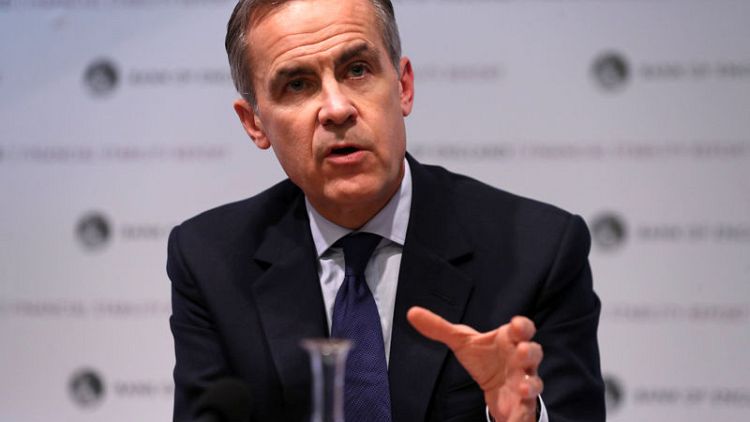By Huw Jones
LONDON (Reuters) - Bank of England Governor Mark Carney on Wednesday likened the $2 trillion (£1.55 trillion) leveraged loan market to subprime mortgages that defaulted 10 years ago and triggered a global financial crisis, in a warning to MPs.
Leveraged loans are made to companies that are highly indebted, and growth has been driven by investment funds and collateralised loan obligations (CLOs) linked to the loans.
"We are concerned just because the pace of growth has been quite rapid for some time," Carney told the MPs.
"The subprime analogy... isn't perfect, but it's on the road to 'no doc' underwriting which happened 11 years ago."
'No doc' refers to the lack of affordability checks on subprime home loans in the United States before the crisis.
Last year the Bank tested British banks' exposure to leveraged loans by applying shocks that were greater than those seen during the financial crisis, Carney said. All the banks passed.
The Bank first made similar warnings to Carney's in its November Financial Stability Report, which was the subject of Wednesday's hearing in the Treasury Select Committee in parliament.
London is Europe's centre for leveraged loans, boosting profitability of banks and bringing in foreign capital to help Britain fund its current account deficit.
"My personal sense is the market is undergoing an adjustment, there is greater focus on underwriting," Carney said.
Richard Sharp, a member of the BoE's Financial Policy Committee, said leveraged lending needed to be better managed, not banned.
"It's not just all bad. It's a source of major employment and profitability here. It lowers the cost of capital for investment," Sharp said.
Debt based on U.S. subprime mortgages was tucked away in "shadow banks" in the run-up to the financial crisis, making it harder to assess exposures, said Alex Brazier, BoE executive director for financial stability.
Exposures at UK banks to leveraged loans is among the lowest in the world, accounting for about 1 percent of global stock of CLOs, and 1.5 percent of the major banks' core capital buffers, BoE data showed.
"That is one of the big differences with subprime. Even if the growth rates look the same, the underwriting standards have some disturbing similarities... there is none of this shadow banking activity," Brazier said.
(Reporting by Huw Jones; Editing by Gareth Jones)



